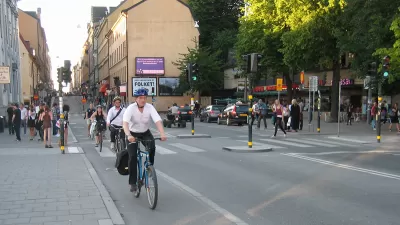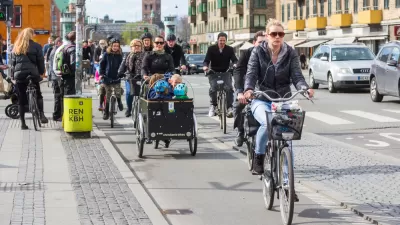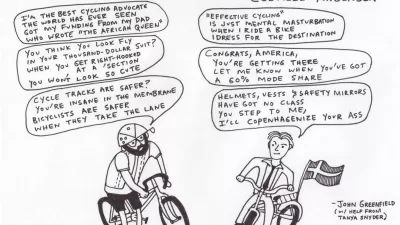Mikael Colville-Andersen discusses the benefits and methods of designing bicycle infrastructure within a city in a TEDxZurich talk.

Dylan Love from Business Insider discusses a TEDxZurich talk by Mikael Colville-Andersen on Bicycle Culture by Design. Colville-Andersen is an urban designer, the founder of Copenhagenize Design Company, and a noted speaker who travels the world to preach the merits of good design for bicycle infrastructure.
His TEDxZurich talk is highly engaging, as he illustrates the changing nature of our streets since the dawn of cities and civilization. Once places of public domain for people to transport, gather, or sell commerce, streets today are largely reserved for automobiles. Colville-Andersen blames this shift in usage largely on campaigns by car companies and traffic engineers.
Indeed, with cars rampant in the streets, new problems emerged, like deaths, congestion, and air pollution. However, many of the solutions to these automobile-induced problems are left at the drawing table because they do not fit into "the mathematical equation on the computer down at the engineering department. So many ideas die on their doorstep." Colville-Andersen pushes for a shift in urban planning, from engineering our streets to designing them on a human scale.
FULL STORY: This Guy's Ted Talk Describes The Next Great Design Challenge For Changing The World

Planetizen Federal Action Tracker
A weekly monitor of how Trump’s orders and actions are impacting planners and planning in America.

Map: Where Senate Republicans Want to Sell Your Public Lands
For public land advocates, the Senate Republicans’ proposal to sell millions of acres of public land in the West is “the biggest fight of their careers.”

Restaurant Patios Were a Pandemic Win — Why Were They so Hard to Keep?
Social distancing requirements and changes in travel patterns prompted cities to pilot new uses for street and sidewalk space. Then it got complicated.

Platform Pilsner: Vancouver Transit Agency Releases... a Beer?
TransLink will receive a portion of every sale of the four-pack.

Toronto Weighs Cheaper Transit, Parking Hikes for Major Events
Special event rates would take effect during large festivals, sports games and concerts to ‘discourage driving, manage congestion and free up space for transit.”

Berlin to Consider Car-Free Zone Larger Than Manhattan
The area bound by the 22-mile Ringbahn would still allow 12 uses of a private automobile per year per person, and several other exemptions.
Urban Design for Planners 1: Software Tools
This six-course series explores essential urban design concepts using open source software and equips planners with the tools they need to participate fully in the urban design process.
Planning for Universal Design
Learn the tools for implementing Universal Design in planning regulations.
Heyer Gruel & Associates PA
JM Goldson LLC
Custer County Colorado
City of Camden Redevelopment Agency
City of Astoria
Transportation Research & Education Center (TREC) at Portland State University
Camden Redevelopment Agency
City of Claremont
Municipality of Princeton (NJ)





























